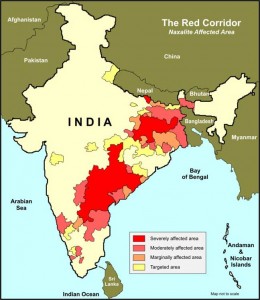Added to that has been the gradual withdrawal of governance from district after district capped by the all pervasive corruption. Political class found it more profitable to keep these people in a state of poverty, ignorance and deprivation to stay in power. Turmoil and unrest in these areas made siphoning of funds that much more easy. Consequently there were the vested interest to maintain status quo. At the same time these conditions created fertile grounds for the Maoist groups to spring to life and find wide ranging support amongst the dispossessed. As governance kept shrinking, the Maoist kept enlarging areas under their control. They terrorise locals, set-up peoples courts to dispense instant justice, collect revenue and retaining money from those operating mines and toll from transport vehicles. Terrorised, disillusioned and alienated the populace extended support to them and denied the same and intelligence to the police.
 As governance shrank, police high-handedness increased leading to further alienation of locals. District officials never stirred out and functioned from within their high security residences and offices and on return to Delhi, became experts in dealing with Maoist menace. State governments abdicated their basic function of governance and created Salwa Judum to supplement police, which on its part indulged in excesses and in many cases joined the Maoists taking weapons with them. This abdication of governance also led to many helpless poor being coerced into joining the Maoists armed groups. Some others found exercising power through the gun a heady experience.Given such conditions, Maoists kept enlarging their armed groups and area of influence, while Delhi and affected states adopted lackadaisical attitude: took no corrective action nor held any one accountable for this slide and consequently the descent to the present state, where the call to bring in the weapon of last resort (Army) has become shriller.
As governance shrank, police high-handedness increased leading to further alienation of locals. District officials never stirred out and functioned from within their high security residences and offices and on return to Delhi, became experts in dealing with Maoist menace. State governments abdicated their basic function of governance and created Salwa Judum to supplement police, which on its part indulged in excesses and in many cases joined the Maoists taking weapons with them. This abdication of governance also led to many helpless poor being coerced into joining the Maoists armed groups. Some others found exercising power through the gun a heady experience.Given such conditions, Maoists kept enlarging their armed groups and area of influence, while Delhi and affected states adopted lackadaisical attitude: took no corrective action nor held any one accountable for this slide and consequently the descent to the present state, where the call to bring in the weapon of last resort (Army) has become shriller.
There appears to be no one accountable for the current state of affairs. Not only no heads ever rolled, but those who failed the state kept climbing the promotion ladder and along with others kept amassing wealth. Now when the Home Minister named some police officers who had failed policemen at Dantewada and wanted action against them, we are told that these officers are the very best. If they, even after Dantewada are considered so good what of the others! Pray, then how did we reach this sorry state, where policemen, state and CPOs have become such easy targets.
How have the police, both state and CPOs in the ‘Red Corridor’ descended to such a pathetic state of low morale. Does this state of affairs reflect on the quality of leadership in these forces! There has been no accountability and therefore no sackings, while at the same time more and more senior level posts are sanctioned, making the police and bureaucracy extremely top heavy.
Home Minister claims that he does not have the mandate and yet does not spell out that mandate! If this mandate is the deployment of the army, then he has obviously come to the conclusion that every other means at his disposal has completely failed and is seeking weapon of last resort to tackle this menace. Decidedly such a point has not been reached. Surely, this exceptionally large body of CPOs and states special forces cannot be so very helpless to tackle this rag-tag group of Maoists.
Those who clamour for deployment of army and air force seem to forget the scale of collateral damage air strikes did against insurgents in Aizwal in 1996. Army if deployed would attempt to produce quick results. Given the poor state of available intelligence, lack of knowledge of ground and language, the possibility of innocent people, parched and famished due to long years of neglect, injustice and repression, getting buffeted between the Maoists and the army is very much there. Moreover deploying a couple of RR battalions with an amorphous nature of command and control and general lack of coordination between the army and police forces (of all hues) and lack of free flow of actionable intelligence in such a setting will hamper operations and could lead to targeting wrong people.




